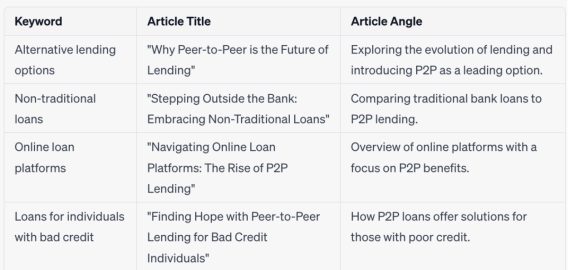
Search engine optimization is changing. Generative AI is streamlining many SEO-related tasks. Search results pages are evolving. However, businesses with small to medium-sized websites and a content management system or SEO-friendly e-commerce platform can do a lot of SEO work in-house.
Here are my top 10 do-it-yourself SEO tips, including related ChatGPT pointers.
1. Search keywords
Keyword research has two benefits. First, discovering and organizing relevant search queries reveals the words and phrases consumers use to find goods and services. Merchants can use these keywords in product descriptions, titles, and blog posts, all to improve organic search rankings.
Second, knowing how consumers search for wants and needs uncovers competitors (who rank for those keywords) and generates ideas for new or improved products.
There are quite a few free and freemium keyword research tools out there. Organizing keywords by common intent is time-consuming, but it can be done with spreadsheets.
ChatGPT can expand a list of keywords. Here’s a hint:
My main term is [KEYWORD]. Generate a list of related keywords to capture the attention of those who may not know [KEYWORD] but you may find it useful. For each related keyword, come up with an article title and an angle of how it helps. Answer in table format.
ChatGPT can expand a keyword list to include potential titles and angles. This example is for the keyword “peer-to-peer lending”. Click on the image to enlarge it.
ChatGPT can (i) generate a content strategy based on a list of keywords, (ii) identify keywords to include on a page, and (iii) describe a buyer for each keyword:
This is my list of keywords. [KEYWORD LIST] Create a table organizing the keywords by meaning. For each group, add a target persona and an article title. Include the search volume for each keyword in a separate column.
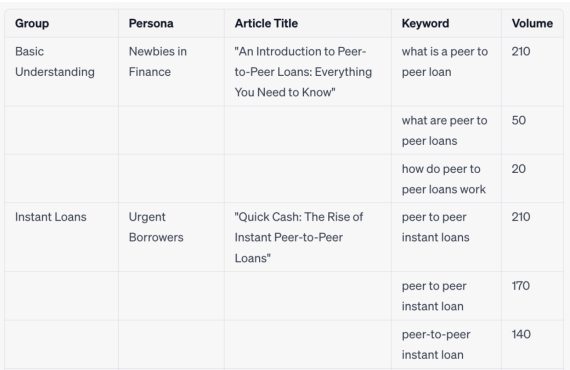
This ChatGPT table organizes keywords by meaning, with people, article titles, and search volume. Click on the image to enlarge it.
2. Identify keyword gaps
A keyword gap is a search query for which two or more competitors rank, but your site does not. Premium tools like Ahrefs and Semrush can identify missing keywords, representing opportunities for your brand.
The complete analysis takes no more than 30 minutes. You’ll have new content ideas, new pages to build, and information queries to address.
3. Build internal links
Internal linking is key to organic search visibility for important pages. Google crawls websites using links. Their algorithm assigns equity to each page in part based on how many internal and external links point to it.
Google does not provide any guidance on internal links or where they should reside. But over the years, Googlers have hinted at the priority:
Main navigation Within content, such as the body of blog posts. Bottom of the page. Above the fold (top of page). sidebar
An internal linking strategy should include everything. Display content widgets like Related, Top, and Popular, and make sure your key pages are linked directly from the main navigation or just a click or two away.
You can also create a list of your important pages and ask ChatGPT to convert the list into sets of internal links to add to your site:
Here is a list of my important URLs with title tags. [LIST OF URLS, TITLE TAGS] Create HTML from this list that I can add to all pages to link to. Do not use the entire title for each link. Make it shorter but easy to understand.
4. Improve clicks
While keyword research identifies ranking opportunities, click-through optimization drives more traffic from existing positions.
Rich snippets stand out in search results, requiring minimal coding using Schema.org or similar markup. Third-party plugins make the job easier.
Google often enhances search snippets with additional information, such as comparisons, lists, and “pros” and “cons” in product review snippets.
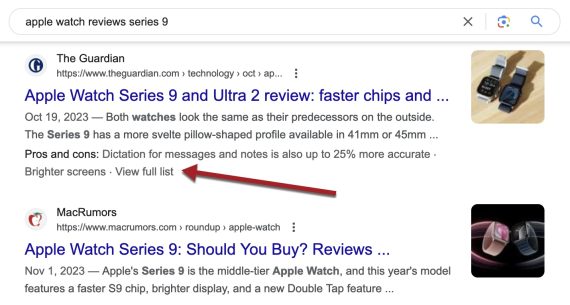
Google often enhances search snippets with additional information such as “pros” and “cons”. This example is for the query “Apple Watch Reviews Series 9”. Click on the image to enlarge it.
Organize your content to help Google create more detailed search snippets. ChatGPT can help:
Here are my article listing tools. [ARTICLE TEXT] For each tool, add “pros” and “cons” as a bulleted list.
Generative AI can also enhance product descriptions using specifications and images.
5. Optimize title tags
Title tags are slowly losing organic ranking power, but they are still important. Including keywords in the title tells Google the purpose of the page. Also, a well-designed title will likely be the most visible part of a standard search results snippet. Thus, titles also affect clicks.

Title tags are usually the most visible part of a search results snippet and therefore affect clicks. Click on the image to enlarge it.
ChatGPT can generate attractive title tags:
For this article, develop 10 essential title tags and H1 headings in table format. [ARTICLE TEXT] Use different engagement tactics (eg questions, punchy words). Explain how each title and heading can attract more clicks.
6. Create useful content
Knowing a page’s main keyword and including it in the title (and body, if it makes sense) is a critical component of optimized content. But the most important tactic is to create information that is truly useful to consumers. Ultimately, it’s impossible to optimize content that no one wants to read or see.
Google now understands searcher intent and content relevance and value. But it all starts with useful content that serves target consumers and answers their questions, as revealed in search queries.
ChatGPT can generate ideas for improvement:
This is my article. [ARTICLE TEXT] I want it to rank [KEYWORD]. How can I improve the article? Which person am I not targeting?
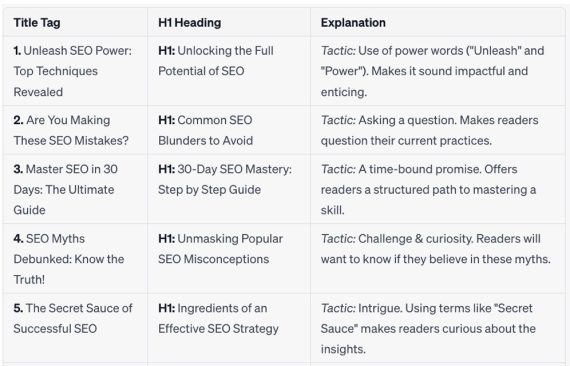
ChatGPT can generate title tags, H1 headings and tactics to improve an article’s ranking. Click on the image to enlarge it.
7. Update old content
Most content slowly loses organic traffic. Older content produces fewer clicks, mainly due to the date of the search snippet. Also, Google strives to display newer content.
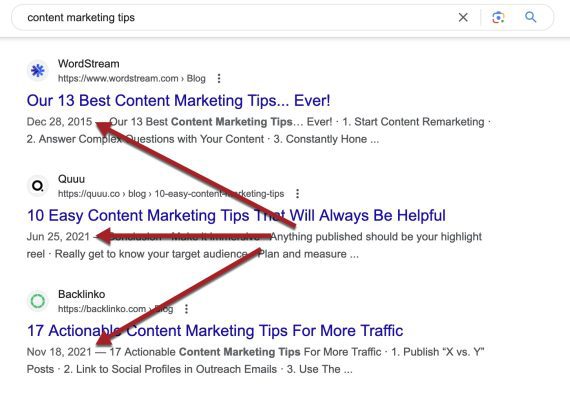
Older content produces fewer clicks, mainly due to the date of the search snippet. Click on the image to enlarge it.
Updating the content with fresh information (new references, contemporary descriptions, more) can recover much of the loss.
ChatGPT can help. Keep these three pointers in mind:
Here is my article. [ARTICLE TEXT] In table format, generate takeaways, a FAQ section of four to six questions with short answers, and a summary. Turn this article into a script for a podcast voiceover. [ARTICLE TEXT]
Here are expert quotes on new trends for [MY INDUSTRY]. Generate captions and intros for each budget. [QUOTES]
8. Monitor Analytics
Two Google tools, Analytics and Search Console, are critical to understanding organic search performance. They report pages with the most organic traffic, keywords that drive traffic, and traffic engagement and conversions, among other metrics.
At the very least, check your analytics regularly for traffic drops or site errors. Both require immediate attention.
9. Build Link Equity
Link building is the most difficult SEO task. The work is never done. Google uses backlinks in part to report whether content is trustworthy. Links from reputable news sources, for example, build trust.
The good news is that link building can be done at home.
The best link building tactic is to produce quality content that people want to share. Encourage sharing by participating in niche communities, connecting with like-minded people, and reaching out to journalists.
Never pay for a link directly or indirectly through a consultant. If it’s easy to get, the link is likely useless or worse.
ChatGPT can provide link building ideas based on these pointers:
My business is [PRODUCT DETAILS]. Who should I approach to increase brand awareness and how? Which podcasts should I target? Provide a disclosure email for each.
10. Educate yourself
Finally, there is no substitute for knowledge. Learn SEO. There are lots of great free resources out there.
Round table of search engines is my go-to source for curated news and advice. Moz’s blog it’s a useful, clutter-free resource. My weekly column here focuses on e-commerce.
Beyond DIY
All online marketers should perform some level of DIY SEO. Save money and generate traffic. However, some tasks probably require professional help. Examples include encoding changes, structured data, and site speed.
[ad_2]
Source link




